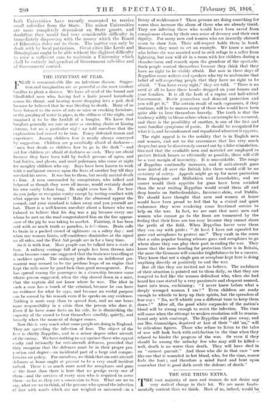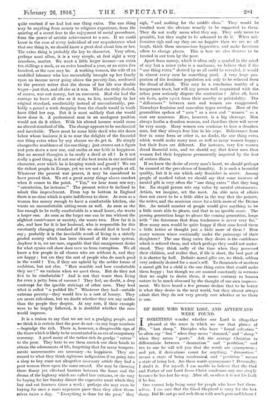THE ONE THING EXTRA.
THE vast majority of men and women do not desire any very radical change in their lot. We are more funda- mentally content than we think. Most of us, indeed," would lie
quite content .if .xse . had but..one thing extra: The one thing may be anything from money to religious experience, from the quieting of a secret fear to the enjoyment of social precedence, from • the power of artistic achievement to a son. If we could know in the case of every individual of our acquaintance what that one thing is, we should know a great deal about him or her. The .extra thing is probably the key to character. Very often, perhaps most often, it is a very simple, at first sight a very mundane, matter. We want a little larger income—an extra ten shillings a week, or an extra hundred a year, or an extra five hundred, as the case may be. A working woman, the wife of an unskilled- labourer who has successfully brought up her family upon an income never going above the poverty-line, confessed to the present writer that the dream of her life was double wages—just that, and all else as it was. What she truly desired, of course, was not money, but an easement. Had she had the courage to leave all else as it was, to live, according to her original standard, comfortably instead of uncomfortably, pro- bably a pound a week dropping from the clouds would in truth have filled her cup. But it is most unlikely that she would have done it. A professional man in an analogous position would not do it either. With his altered income would come an altered standard of life. The change appears to be mechanical and inevitable. There must be some little devil who sits down below whose business it is to sour the delights of the financial one thing extra when 'by any chance we do get it. He simply changes the semblance of the one thing ; just crosses out a figure and puts down a new one, and smiles at our faith in happiness. But on second thoughts is he really a devil at all ? Is it not really a good thing, is it not one of the best traits in our national character, over which he is keeping watch and guard ? We are the richest people in Europe, yet we are not a soft people at all. Whatever .the present war proves, it may be considered to have proved that. We set a great. many things above comfort when it comes to the point. " Yes," we hear some one say; " ostentation, for instance." Tho present writer 'is inclined to admit this impeachment. From top to bottom in England there is no class which is quite indifferent to show. As soon as a Woman has money enough to have a comfortable kitchen, she wants an uncomfortable sitting-room as well. As soon as she has enough to be really comfortable in a small house, she wants a larger one. As soon as the larger one can be run without the slightest contrivance or anxiety, she wants two. How far it is she, and how far it is her husband, who is responsible for this constantly changing standard of life we should find it hard to say ; probably it is the inevitable result of living in a strictly graded society which has been cleansed of the caste system. Anyhow it is, we are sure, arguable that this omnipresent desire for what cynics call show does save us from corruption. We all know a few people in all classes who are without it, and they are happy ; but are they the sort of people who do much good in the world ? Yes, if they are upheld by the nobler forms of ambition, but not else. " How sensible and how comfortable they are ! we exclaim when we meet them. But do they not live to be comfortable ? And is not that worse than living for even a petty form of success ? They feel, no doubt, a deep contempt for the ignoble strivings of other men. They lead what is called " a padded life." Whatever they had—outside extreme poverty—they would live in a sort of luxury. They are never ridiculous, but we doubt whether they are any nobler than the people they despise. At any rate, if their example were to be largely followed, it is doubtful whether the race would improve.
It is a truism to say that we are not a grudging people. and we think it is certain that the poor do not—in any large numbers —begrudge the rich. There is, however, a disagreeable sign of the times which is likely to be accentuated in an era of compulsory economy. A good many of the rather rich do grudge " extras " to the poor. They hate to see them stretch out their hands to obtain the adornments of life, forgetting 'that for many tempera- ments unnecessaries are necessary—to happiness. They arc roused to what they think righteous indignation if on going into a shop to buy some not altogether necessary article they find a poor woman there upon the same errand. She may be choosing those flimsy yet effectual barriers between the home and the drama of the highway which are called lace curtains, or she may be buying for her Sunday dinner the expensive meat which they buy and eat fourteen times a week ; perhaps she may even be buying for once a more expensive piece than they allow them- selves twice a day. " Everything is done for the poor," they
sigh, "and nothing for the middle class." They would be insulted were the obvious remedy to be suggested to theM. They do not really mean what they say. They only mean to grumble, but they ought to be ashamed to do it. When mil- lionaires sigh and say they are no happier than we are we all laugh, think them unconscious hypocrites, and make facetious offers to change places. This is how we also deserve to be treated in our turn by the poor.
Apart from money, which is often only a symbol in the mind of any but a miser (who is a madman), we believe that if the " one thing extra " desired by us all could be revealed, it would in almost every case be something good. A very large pro- portion of the feminine population ask only to be relieved from; the dread of drink. This may be a conclusion worthy of a temperance tract, but will any person well acquainted with the urban poor seriously dispute the contention ? After all, facts aro facts, quite apart from their novelty or palatability. The " differences " . between men and . women are exaggerated. Nowadays feminine and masculine types overlap. Most of the generalities spoken of " men " as a race and " women " as a race are nonsense. Here, however, is a big . cleavage. Men always loathe a drunken woman, and therefore there will never be very many. Many women can continue to love a drunken man, but they always fear him in his cups. Deliverance from fear in some form or other is, no doubt, the one thing extra which would make many men as well as many women happy; but their fears are different. For instance, very few women dread financial ruin, and we should say that fewer men than women feel their happiness permanently impaired by the fear
of serious illness. •
If we knew the desire of every man's heart, we should perhaps be amazed at the prevalence of humility. It is such a beautiful quality, but it is one which only flourishes in secret. Among people of marked talent we should say that some increase of mental gift is very often the " one thing extra " that they long for. No stupid person sets any value by mental attainments. Artists, we imagine, set the most. An able man of affairs does not crave to be a little abler in the way that the painter, the writer, and the musician crave for a little more of the Divine fire. An untold number of people would give anything to be a little more able to please, and that in no ignoble sense. The passing generation longs to please the coming generation,- longs with " the fierceness that from tenderness is never very far." How many men would be quite happy if their sons loved them a little better or thought just a little more. of them ? How many women wince continually under the patronage of their daughters ? The one thing extra they desire is the confidence which is refused them, and which perhaps they could not under, stand. They think sadly of the time when they possessed their children, and realize that, if life is short, the best part of it is shorter by half. Definite moral gifts are, we think, seldom very ardently desired for a man's self. To thousands of mothers a moral gift for a child is the ono thing extra that would make them happy ; but though we are assured constantly in sermons that we Ought to desire them, it seems contrary to human nature to be much obsessed by the thought of our own improve- ment. We have heard a few persons declare that to be. better is what they desire in the next world, but they almost always admit that they do not very greatly care whether or no there. is one.



































 Previous page
Previous page